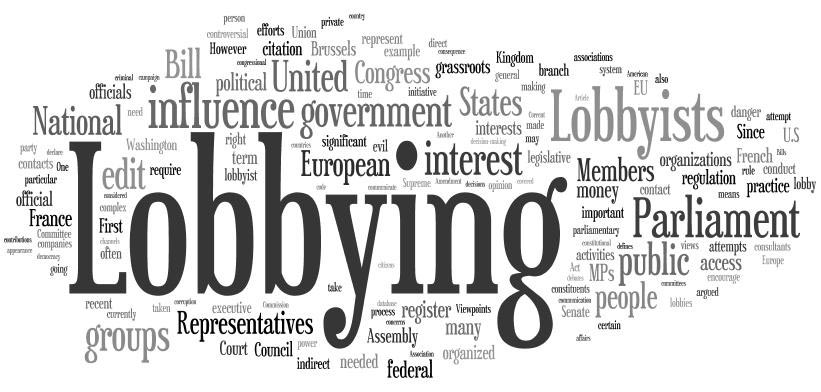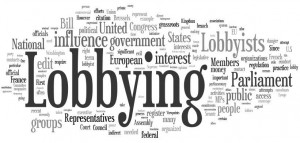WHAT IS LOBBYING?
Lobbying is a word which may have negative connotations in some people’s minds. Those people who are not close to the political process sometimes think that if politicians were able to make decisions in an environment free of lobbying , then better better decisions could be made. This is a misconception of the political process.
The act of attempting to influence business and government leaders to create legislation or conduct an activity that will help a particular organization is called lobbying. People who do lobbying are called lobbyists.
Lobbying builds relationships with elected officials and educates them, develops leaders and their credibility within your organization or network, and sets the stage for ongoing advocacy. Lobbying also serves as a complement to network-or base-building and media advocacy –all three strategies work together to create a successful advocacy campaign
Lobbying occurs only in governmental decision making. Decisions made by private individuals, organizations, or corporations may be influenced by special interests, but the influence should not be called lobbying. All lobbying is motivated by a desire to influence. Many actions and events may affect the outcome of governmental decisions, but if they are not accompanied by an intent to influence, there is no lobbying. Lobbying implies the presence of an intermediary as a communication link between citizens and governmental decision makers. A citizen who, of his own volition and by his own means, sends a message to a governmental decision maker is not considered a lobbyist even though he is attempting to influence governmental decisions. All lobbying involves communication, for that is the only way that influence can be transmitted. Broadly defined, lobbying is the stimulation of a communication, by someone other than a citizen acting on his own behalf, directed to a governmental decision maker with the hope of influencing his decision.
Lobbying should be thought of as a process rather than as an organization. It is most helpful to think of it as a communication process by which lobbyists attempt to get governmental officials to accept the policy desires of lobbying clients. It is the lobbyist’s job to create messages and to choose means of transmission that are most likely to ensure clear and favorable reception of the message by the intended receiver. This means that the lobbyist must anticipate the predispositions of his intended receiver and so act that the message will be favorably received with as little distortion as possible. He must take care that the message is not intercepted or blocked. He must choose a transmission channel that is open, is not likely to be overloaded, and has a low noise level.
WHO IS LOBBYISTS?
LOBBYIST means a person who is employed and receives payments, or who contracts for economic consideration. A person who lobbies as a regular and usual part of employment, whether or not any compensation in addition to regular salary and benefits is received. A consultant to the state, county, or municipal levels of government or their instrumentality. Most lobbyists are hard–working professionals who understand how to navigate the political process, gain access to lawmakers and key executive–branch officials, and build a strategy to achieve their legislative goals.





12 Comments. Leave new
nice!
Interesting
Nice.
Good work
Informative
Well written
Well written
Worth a read.
nice work!!
Well researched!
good one
nice one